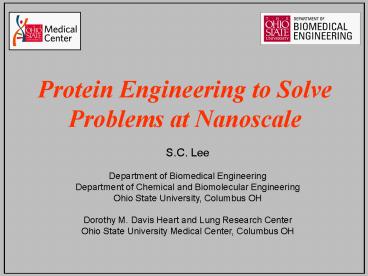Protein Engineering to Solve Problems at Nanoscale
1 / 16
Title:
Protein Engineering to Solve Problems at Nanoscale
Description:
... Gene yfp-Your Favorite Protein Phage display links variant gene to the protein it specifies Libraries screened by affinity 1011 variants ... Enrichment ... –
Number of Views:108
Avg rating:3.0/5.0
Title: Protein Engineering to Solve Problems at Nanoscale
1
Protein Engineering to Solve Problems at
Nanoscale
S.C. Lee Department of Biomedical
Engineering Department of Chemical and
Biomolecular Engineering Ohio State University,
Columbus OH Dorothy M. Davis Heart and Lung
Research Center Ohio State University Medical
Center, Columbus OH
2
Background
MIG
Streptavidin
Reality of bioHFET protein sensing (Gupta et
al., 2008)
Concept of FET protein sensing
Erroneous classical model (Schoning and
Poghassian, 2002)
To make a clinically useful MIG sensor
-Increase sensitivity 200X (Currently at
10-30nM) -Identify anti-MIG antibody fragments
3
HFET signal is inversely related to salt
concentration
(Schoning and Poghassian, 2002)
(Shapiro et al., 2007, Gupta et al. 2008, Wen et
al., submitted)
so there is a sensitivity issue related to a
nanoscale parameter, addressable with protein
engineering
4
Optimization opportunities
5
Clinical relevance of sensing MIG
- CXCL9 (or MIG) is a chemokine, involved in
inflammatory processes - Made by monocyte/macrophages
- Chemoattractant for T-lymphocytes
- Positively correlated with transplant rejection
- Normal concentration 40-100 pM
- Disease concentration as high as 34 nM
- Highly positively charged protein
- Net 20 positive charges per molecule at pH 7.4
6
Antibody Fragments
3-4 nm
12 nm
scFv
- scFv one VariableHeavy (VH) and Variable Light
(VL) chain
7
Phage Display for anti-MIG ab
- Phage display links variant gene to the protein
it specifies - Libraries screened by affinity
- 1011 variants/screen
yfg-Your Favorite Gene
yfp-Your Favorite Protein
Incubation with biotinylated-MIGvarying
Concentrations
Use of solid support system to display MIG to
phage
Elution of phage
Repeat 4-6 times
Identify unique sequences from each round of
selection and express
Phage titer and amplification
8
Phage Enrichment
Round MIG
I 40 nM
II 1 nM
III 1 nM
IV 1 nM
9
Chemoselective scFv conjugation
orients scFvs
10
N-end specific oxidation of ser-terminated
proteins
Lee et al., 2004
Intact
Trypsin digested
SAM
SAM
Eteshola et al., 2006, 2007, Shapiro et al., 2007
11
Differential epitope recognition
..with chemoselectively oriented scFvs
12
MIG structure and charge distribution.
3-4 nm
White-Neutral Blue-Positive Red-Negative
makes differential epitope recognition a way to
tune charge-surface distance
13
Changing receptor topography Scanning circular
permutagenesis
Eteshola et al., 2006, 2007
14
Improving the polymeric film
Real APTES
Ideal APTES
APDMES
Bhushan et al., 2009
Thinner, non-crosslinked film -Better
sensitivity -Saturates (biochemically) at
lower analyte concentration -Smoother
-More mechanically robust
15
Summary
- The classical planar immunoFET analysis is
inaccurate - The flaws are conceptual the model cant be
redeemed - Data from MIG detecting HFETs contradict the
model - Distance between bound charges and sensing
surface is critical to magnitude of response - Protein engineering and bioconjugate chemistry
can address nanoscale issues - Modulating receptor topography (CP) can modulate
the critical distance - Epitope recognition specificity influences the
critical distance - The critical distance can be modulated by careful
SAM selection and construction
16
Acknowledgements
- Surface Functionalization
- Theo Nicholson III
- Samit K. Gupta
- Edward Eteshola
- John P. Shapiro
- Mark Elias
- Matt Keener
- AlGaN Fabrication/Characterization
- Wu Lu
- Leonard Brillson
- Xuejin Wen
- Surface Characterization
- Bharat Bhushan
- Kwang Joo Kwak
- Dharma Tokachichu
- Funds
- National Science Foundation
- Department of Homeland Security































